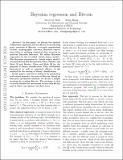Bayesian regression and Bitcoin
Author(s)
Shah, Devavrat; Zhang, Kang
DownloadShah_Bayesian regression.pdf (870.6Kb)
OPEN_ACCESS_POLICY
Open Access Policy
Creative Commons Attribution-Noncommercial-Share Alike
Terms of use
Metadata
Show full item recordAbstract
In this paper, we discuss the method of Bayesian regression and its efficacy for predicting price variation of Bitcoin, a recently popularized virtual, cryptographic currency. Bayesian regression refers to utilizing empirical data as proxy to perform Bayesian inference. We utilize Bayesian regression for the so-called “latent source model”. The Bayesian regression for “latent source model” was introduced and discussed by Chen, Nikolov and Shah [1] and Bresler, Chen and Shah [2] for the purpose of binary classification. They established theoretical as well as empirical efficacy of the method for the setting of binary classification. In this paper, instead we utilize it for predicting real-valued quantity, the price of Bitcoin. Based on this price prediction method, we devise a simple strategy for trading Bitcoin. The strategy is able to nearly double the investment in less than 60 day period when run against real data trace.
Date issued
2014-09Department
Massachusetts Institute of Technology. Department of Electrical Engineering and Computer Science; Massachusetts Institute of Technology. Laboratory for Information and Decision SystemsJournal
Proceedings of the 2014 52nd Annual Allerton Conference on Communication, Control, and Computing (Allerton)
Publisher
Institute of Electrical and Electronics Engineers (IEEE)
Citation
Shah, Devavrat, and Kang Zhang. “Bayesian Regression and Bitcoin.” 2014 52nd Annual Allerton Conference on Communication, Control, and Computing (Allerton) (September 2014).
Version: Original manuscript
ISBN
978-1-4799-8009-3